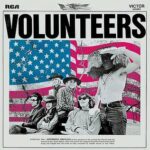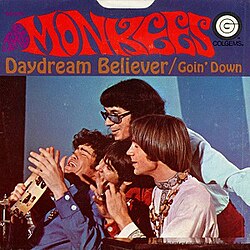 Jefferson Airplane’s “Volunteers,” released in 1969 as the title track of their politically charged album Volunteers, stands as one of the most iconic and enduring songs of the late 1960s counterculture movement. A potent blend of psychedelic rock, folk-rock, and acid-infused urgency, the track exemplifies Jefferson Airplane’s unique ability to combine musical experimentation with socially conscious lyrics. “Volunteers” captures the zeitgeist of an era defined by political activism, anti-war sentiment, and a generational demand for social change. Its explosive energy, confrontational lyrics, and masterful instrumentation make it not just a standout track of the band’s catalog but also a defining anthem of the period, embodying both the rebellious spirit of the time and the enduring power of rock music as a tool for cultural expression.
Jefferson Airplane’s “Volunteers,” released in 1969 as the title track of their politically charged album Volunteers, stands as one of the most iconic and enduring songs of the late 1960s counterculture movement. A potent blend of psychedelic rock, folk-rock, and acid-infused urgency, the track exemplifies Jefferson Airplane’s unique ability to combine musical experimentation with socially conscious lyrics. “Volunteers” captures the zeitgeist of an era defined by political activism, anti-war sentiment, and a generational demand for social change. Its explosive energy, confrontational lyrics, and masterful instrumentation make it not just a standout track of the band’s catalog but also a defining anthem of the period, embodying both the rebellious spirit of the time and the enduring power of rock music as a tool for cultural expression.
Musically, “Volunteers” is immediately striking with its aggressive tempo, driving guitar riffs, and dynamic rhythm section. The song opens with an electrifying guitar chord that sets the tone for the track’s explosive energy, signaling both urgency and defiance. Jorma Kaukonen’s guitar work is particularly notable for its combination of rhythmic drive and melodic sensibility, weaving between blues-infused riffs and psychedelic flourishes that create a sense of tension and release throughout the song. The bass line, provided by Jack Casady, is both foundational and melodic, anchoring the chaotic energy of the guitars while adding its own intricate counterpoint that enhances the song’s forward momentum. Spencer Dryden’s drumming is powerful and precise, propelling the track with relentless energy while punctuating key moments with well-timed fills and dynamic shifts.
Vocal performances on “Volunteers” are central to the song’s impact. Marty Balin’s lead vocals carry a sense of urgency, conviction, and rallying spirit, perfectly aligning with the song’s revolutionary themes. Balin’s voice is both commanding and approachable, inviting listeners to participate in the communal energy of rebellion and social change. Grace Slick’s backing vocals and occasional lead interjections add a layer of dramatic intensity, providing contrast and depth that heighten the track’s emotional resonance. The interplay between Balin and Slick creates a dynamic tension that mirrors the song’s lyrical themes of defiance, activism, and generational upheaval.
Lyrically, “Volunteers” is a call to action, urging listeners to embrace activism, challenge authority, and participate in shaping a better world. The repeated refrain, “Look what’s happening out in the streets / Got a revolution,” encapsulates the song’s central message of social consciousness and collective action. The lyrics reflect the urgency of the late 1960s, when protests against the Vietnam War, civil rights struggles, and broader demands for societal change were at the forefront of public consciousness. The song’s direct and confrontational language is emblematic of Jefferson Airplane’s commitment to embedding political awareness within their music, transforming rock into a vehicle for cultural commentary and empowerment.
The song’s chorus functions as both a melodic and thematic anchor. Its simplicity and repetition make it instantly memorable, while its lyrical content reinforces the track’s rallying cry for collective action. The combination of catchy melody and politically charged lyrics exemplifies Jefferson Airplane’s ability to craft songs that are both musically compelling and socially resonant, allowing the track to connect with listeners on multiple levels. The chorus’s chant-like quality also invites audience participation, enhancing its role as an anthem for communal engagement and rebellion.
Production on “Volunteers” is notable for its ability to capture the raw energy and urgency of Jefferson Airplane’s performance while incorporating elements of studio experimentation. The track’s mix emphasizes clarity and separation, allowing each instrument to shine without sacrificing the overall intensity of the song. The production balances the chaotic energy of the guitars and rhythm section with the melodic clarity of the vocals, ensuring that the song’s message is delivered with impact. Subtle studio effects, including reverb and occasional distortion, enhance the psychedelic texture of the track without overshadowing its core rock energy, reflecting the band’s mastery of both performance and recording techniques.
The cultural significance of “Volunteers” extends beyond its musical and lyrical content. The track embodies the spirit of the late 1960s counterculture, capturing the era’s revolutionary fervor, political activism, and desire for societal transformation. Its call to action resonated with a generation that was deeply engaged in challenging authority, questioning traditional norms, and advocating for change. By articulating these themes through the medium of rock music, Jefferson Airplane contributed to the broader cultural dialogue, demonstrating the potential of popular music to influence public consciousness and inspire collective action.
“Volunteers” also reflects the broader musical trends of its time, particularly the fusion of psychedelic rock, folk influences, and socially conscious songwriting. The band’s use of distorted guitars, dynamic shifts, and unconventional song structures aligns with the experimental ethos of the late 1960s, while the incorporation of clear melodic hooks ensures accessibility and emotional engagement. This combination of experimentation and approachability helped Jefferson Airplane maintain both underground credibility and mainstream appeal, solidifying their position as one of the most influential bands of the era.
The music video and live performances of “Volunteers” further amplified its impact. On stage, the band’s energy, charisma, and musical precision translated into electrifying performances that reinforced the song’s rallying message. Audience interaction, whether through singing along or responding to the song’s call to action, created a sense of communal empowerment that mirrored the broader countercultural movements of the time. The visual imagery associated with live performances—psychedelic lighting, expressive gestures, and dynamic stage presence—complemented the track’s themes of rebellion, freedom, and social engagement, enhancing its cultural resonance.
Instrumentally, the song is notable for its intricate interplay between guitars, bass, and drums. The guitars alternate between melodic leads and rhythmic accents, creating a sense of tension and release that mirrors the song’s thematic content. The bass provides both harmonic foundation and melodic counterpoint, while the drums drive the song’s momentum and accentuate key lyrical moments. Each instrument contributes to the overall narrative of the track, reinforcing its emotional intensity and the sense of urgency embedded in its lyrics. This attention to musical detail ensures that “Volunteers” remains engaging and compelling, even decades after its initial release.
The song’s lyrics also serve as a historical document, reflecting the political and social concerns of the late 1960s. References to street protests, revolution, and collective action capture the energy and aspirations of a generation determined to challenge societal norms and advocate for justice. The song’s direct and unambiguous language ensures that its message is immediately accessible, while its musical sophistication enhances its emotional resonance. By combining politically charged lyrics with compelling musical composition, Jefferson Airplane created a track that is both an artistic achievement and a cultural statement.
“Volunteers” further demonstrates the band’s commitment to blending musical innovation with social commentary. The track’s fusion of rock energy, psychedelic textures, and folk influences creates a sonic landscape that is both dynamic and immersive, supporting the song’s lyrical content and enhancing its emotional impact. This integration of form and content exemplifies Jefferson Airplane’s approach to songwriting, highlighting their ability to craft music that is intellectually engaging, emotionally powerful, and culturally relevant.
The track’s instrumentation also reflects the band’s mastery of musical dynamics. Shifts between quiet, tension-filled passages and explosive, high-energy sections mirror the emotional trajectory of the lyrics, creating a sense of movement and progression that reinforces the song’s narrative. Guitar, bass, and drums are carefully balanced to maintain both clarity and intensity, allowing each instrument to contribute to the overall impact of the track. This dynamic interplay enhances the song’s emotional resonance and ensures its continued appeal to listeners seeking both musical complexity and raw energy.
Culturally, “Volunteers” remains an emblem of the 1960s counterculture and a touchstone for subsequent generations of socially conscious musicians. Its themes of activism, rebellion, and personal responsibility resonate beyond its original historical context, speaking to universal desires for freedom, justice, and self-expression. By embedding these themes within a compelling rock framework, Jefferson Airplane ensured that “Volunteers” would remain relevant and influential, serving as both a historical artifact and a timeless anthem of empowerment.
Ultimately, Volunteers by Jefferson Airplane is a masterful synthesis of musical innovation, lyrical potency, and cultural resonance. Its explosive energy, memorable melodies, and socially conscious lyrics ensure that it continues to captivate audiences, while its historical significance as a product of the late 1960s counterculture adds depth and weight to its impact. The song exemplifies Jefferson Airplane’s ability to balance artistic experimentation with accessibility, creating a work that is both entertaining and profoundly meaningful.
From the first striking guitar chord to the final emphatic vocal refrain, “Volunteers” captures the spirit of rebellion, activism, and generational empowerment that defined an era. Its combination of musical sophistication, narrative depth, and emotional intensity ensures its enduring relevance, making it a highlight of Jefferson Airplane’s career and a quintessential anthem of countercultural rock. The track’s legacy is reflected not only in its influence on subsequent musicians and punk-influenced bands but also in its ongoing cultural resonance, affirming its place as a timeless work of artistic and social significance.
The enduring appeal of “Volunteers” lies in its ability to communicate both urgency and universality. Its rallying cry to participate, challenge, and engage resonates with listeners across decades, while its inventive instrumentation, vocal interplay, and dynamic production create a listening experience that is both visceral and intellectually stimulating. Jefferson Airplane’s Volunteers exemplifies the power of rock music as a medium for cultural expression, social commentary, and emotional connection, making it a defining track of the 1960s and a perennial source of inspiration for artists and audiences alike.
By combining politically charged lyrics, energetic instrumentation, and masterful vocal performances, Jefferson Airplane created a song that is both immediate in its impact and enduring in its cultural significance. Volunteers stands as a testament to the band’s ability to capture the spirit of their time while creating music that transcends its historical context, offering a timeless anthem of rebellion, liberation, and the enduring power of collective action.


